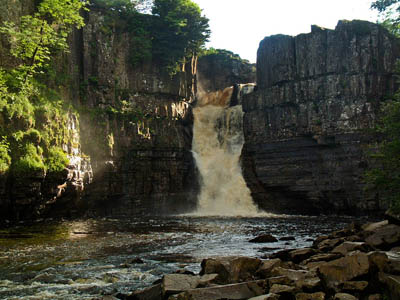
High Force, Upper Teesdale. Photo: Matt Buck
Walkers on the Pennine Way face a diversion while repair work is carried out on an environmentally sensitive section.
Helicopters are bringing 300 tonnes of crushed stone to improve the route west of Wynch Bridge in County Durham. The diversion will take visitors away from Low Force, but they will be able to rejoin the national trail to take in High Force, the 20m (66ft) waterfall near Middleton-in-Teesdale.
The path closure is expected to last two months, but work is dependent on good weather, so there may be a delay in completing the repairs.
The section of the 429km (268-mile) national trail has become badly eroded, resulting in surrounding vegetation being damaged as walkers avoid boggy ground by navigating away from the wettest sections.
This has meant rare flowers such as the yellow globeflower and purple northern marsh orchid suffering under the weight of the 33,000 pairs of boots that pass over the route each year.
The site, along the River Tees’s south bank, is a Site of Special Scientific Interest and a National Nature Reserve.
The project is being overseen by the North Pennines Area of Outstanding Natural Beauty Partnership, working with Durham County Council, Natural England and local landowners and botanical groups.
Simon Wilson, the AONB Partnership’s area co-ordinator said the airlifts were really the only option: “There’s no road access to this very sensitive stretch of the path.
“Wynch Bridge and Holwick Head Bridge at either end of the path are just footbridges, and it’s surrounded by beautiful meadows which could be destroyed if we were to transport stone in by wagon.”
The section previously had some very high stiles which are being replaced during the works. Mr Wilson said: “We have taken the opportunity to remove some difficult structures and replace them with gates.”
The Pennine Way was England’s first national trail, opened in 1965 and running from Edale in the Derbyshire Peak District to Kirk Yetholm, Roxburghshire, in the Scottish Borders.